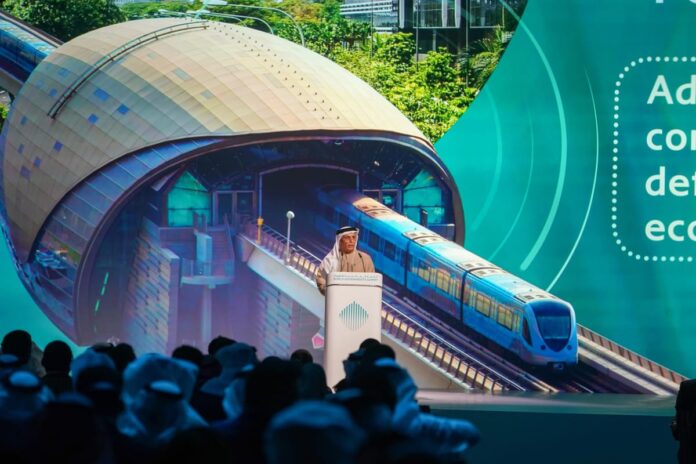Mattar Al Tayer, Commissioner-General for Infrastructure, Urban Planning and Well-Being Pillar, Director-General, Chairman of the Board of Executive Directors of the Roads and Transport Authority (RTA), described Dubai’s adaptability and resilience during the World Governments Summit (WGS) 2024, which takes place from 12-14 February under the theme ‘Shaping Future Governments’.
Al Tayer emphasized the need for future governments to prioritize city development and legislative transformations in the face of global challenges, highlighting Dubai’s success under the leadership of Sheikh Mohammed bin Rashid Al Maktoum. Dubai’s economic achievements, commitment to sustainability, and advancements in technology, including the growth of businesses and technology startups, were underscored as integral elements in the emirate’s global competitiveness and innovation hub status.
“Governments play a key role in driving the transformation of cities into smart cities through the development of flexible policies and regulations that create positive change and stimulate investment. This also includes forging productive partnerships with research and development institutions and tech firms, supporting innovative research, championing the shift towards agile economies and fostering integration and collaboration across all service sectors. Dubai has initiated several projects to aid its transformation into a smart city, such as Dubai Data, Dubai Artificial Intelligence Roadmap, and Dubai Blockchain Strategy,”
Al Tayer noted.
Al Tayer discussed the significance of the logistics services sector in bolstering Dubai’s economy:
“The land commercial transport sector in Dubai is valued at AED 8.4 billion, with expectations to double by 2030.”
“Smart infrastructure plays a vital role in shaping the cities of the future, as it is essential for creating safer, healthier, and more liveable urban spaces. The Government of Dubai has invested in infrastructure development and the integration of smart technologies. Such investments have led to significant economic benefits and enhanced the operational efficiency of the road network and transportation systems,”
Al Tayer said.
“From 2006 until January 2024, around AED 290 billion has been saved in time and fuel due to enhancements to the road network, against a government expenditure of AED 140 billion on road and mass transportation network development. Dubai Metro broke even in 2016, seven years after launching, and projections indicate that by 2030, every dirham spent will yield benefits worth four dirhams.
“The Government of Dubai is committed to enhancing its global leadership in mobility by investing in the expansion and improvement of its road and public transportation networks. Among its recent initiatives is the launch of Dubai Metro Blue Line project. Spanning 30km and connecting 14 stations, this project is expected to serve one million individuals by 2040 and aims to alleviate congestion on certain traffic corridors by 20 percent,”
Al Tayer explained.
Al Tayer highlighted the role of urban planning and smart infrastructure in supporting the cities of the future:
“Land use policies, particularly those for mixed-use urban development, play a pivotal role in creating vibrant and inclusive neighbourhoods. They also enhance the utilisation of available spaces, leading to increased workforce productivity and efficiency, and foster wellbeing by ensuring quick and easy access to different services. For example, Singapore’s urban planning achievements are testament to its efficient land use and sustainable infrastructure development. Meanwhile, Barcelona’s urban design is focused on allocating sufficient pedestrian spaces.”
“The creation of specialised cities by His Highness Sheikh Mohammed bin Rashid Al Maktoum, such as the Dubai Internet City, Dubai Media City, Dubai Industrial City, and Dubai Healthcare City, represents excellent urban planning initiatives. These projects have enabled Dubai to attract around 7,000 global businesses and contributed to promoting holistic development and economic growth. The launch of Dubai’s Master Urban Plan 2040 further underscores the emirate’s commitment to building on its economic achievements. The plan outlines the allocation of 168 square km for economic and industrial activities, a 25 percent increase in space for educational and health facilities, and a 134 percent expansion in areas designated for hospitality and tourism activities,”
Al Tayer said.
“The success of the real estate industry in cities reflects the effectiveness of urban planning. In Dubai, this sector has witnessed remarkable success, securing a prominent spot in the global market and emerging as a top choice for both local and international investors. Post-COVID-19 pandemic, the sector has seen consistent yearly growth, with real estate sales across Dubai hitting AED 412 billion in 2023, a 55 percent increase from the previous year. The volume of real estate transactions grew by 36 percent over the same period, underscoring the sector’s success. Key factors contributing to this achievement include transparency and credibility, ease of investment and capital movement, superior investor services, and the nation’s high standards of security and safety,”
Al Tayer concluded.
More than 4,000 participants from the public and private sectors will participate in 110 interactive sessions at WGS 2024, including 200 speakers from 80 international, regional, and intergovernmental organisations including the UN, the World Bank, the International Monetary Fund, the World Health Organization, the International Atomic Energy Agency and the Arab League. It will also welcome eight Nobel prize winners and provide a platform for 23 ministerial meetings in the presence of more than 300 ministers.
In partnership with a select group of knowledge partners, the Summit will launch more than 25 strategic reports, focusing on the most important practices and trends in vital sectors.
News Source: Emirates News Agency
